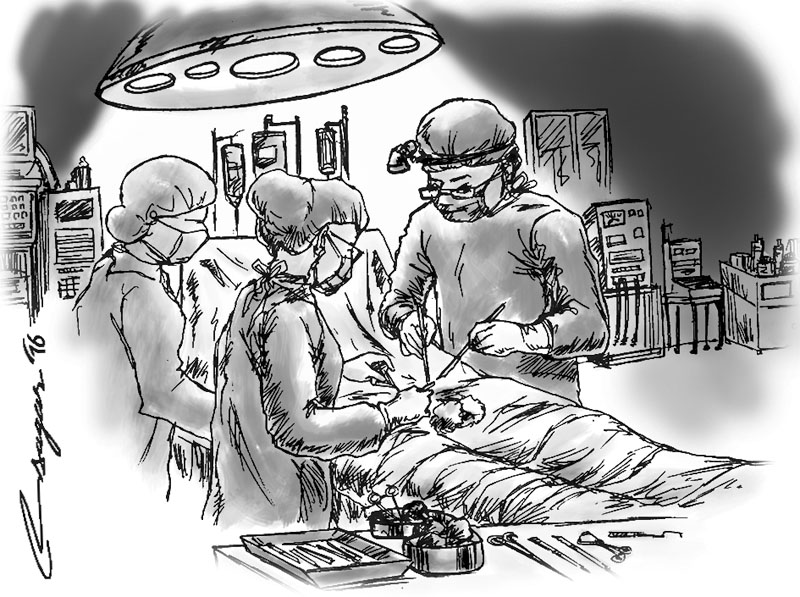Transplant Act 2016: Expectations from it
In Kathmandu alone, road accidents leave around one thousand people brain dead, whose organs, if procured, could save thousands of lives. If the newly amended legislation is implemented effectively, this would save the lives of many Nepalis
World Kidney Day is marked every year on the second Thursday of March. One out of every ten persons is likely to suffer from kidney diseases, and it’s a steadily growing problem worldwide. Recognising this issue, World Kidney Day is celebrated to educate people about kidney-related diseases, their treatments as well as preventative measures that can be taken to reduce the chances of contracting those diseases. Every year 3000 Nepalese suffer from kidney failure and unfortunately, 90% of them die within the following few months.
Organ transplantation is the best possible treatment not just for kidney failures but end-stage failure of various other organs as well. Recently, an organ donation and transplantation legislation of 1998 was amended by the parliament in 2016, which makes this year’s celebration even more important. Procurement and transplantation of organs as mentioned in the newly amended legislation will greatly reduce the need for Nepali citizens to travel abroad to get an organ transplant. The new legislation includes a few very important upgrades compared to the previous one. Human Organ Transplantation (Regulation and Prohibition) Act of 1998 had limited the people that could donate their organ from a relative to the immediate family members and cousins (excluding aunts) only.
The new law also paves the way for paired exchange provisions between two or more families. If someone in a family experiences an organ failure and has a willing donor but is unable to receive it due to incompatible crossmatch, the person can receive the organ from another family who is undergoing similar problems and the donor in their family is a match. Thus, the donors could ‘exchange’ organs and donate to recipients in the other family. Western countries are relying more and more on this novel method of organ donation. One of the most important aspects of the new law is the procurement of viable organs from a brain dead person. In developed nations, more that 80% transplantations are done using organs procured from brain dead people. At least 8 different organs can be harvested from one brain dead person such as, two kidneys, two lungs, one heart, one liver, one pancreas, one small intestine as well as two corneas and skin.
If a brain dead person had not given consent for organ donation prior to his/her death, any member of the family can give a written consent for the donation. However, if the deceased had specifically declined consent for organ donation while s/he was alive, then the organs cannot be procured even if a family member gives a written consent afterwards.
Any hospital or health centre that declares a person brain dead must immediately inform a coordination unit designated by the Nepal Government. Upon receiving the information, the unit must then contact related health institutions for organ procurement and transplantation. The donor hospital will be responsible for providing necessary resources for organ retrieval procedures whereas the co-ordination unit will arrange the proper storage of the organs. It must also have extensive database of organ recipients as well as distributing the organs following strict government criteria. At present, Human Organ Transplant Centre in Bhaktapur is the designated unit for those duties. HOTC was highly influential in advocating changes in the legislation of 1998. HOTC has been performing one hundred transplants per year and is planning to initiate liver transplant in the near future.
The Nepal Government can provide specified monetary compensation to the family or members of the brain dead patient whose organs have been used in transplantation. The new legislation is very flexible yet thorough in clarifying as well as encouraging (via monetary incentives) to effectively procure and transplant organs. According to an estimate, in Nepal, approximately three thousand people suffer from kidney failures. One thousand suffer from liver failures; about three million suffer from diabetes, as well as numerous heart and lung failures. All of these patients could benefit from organ transplantation and have an opportunity to live a new healthier life which in turn could highly benefit the nation.
In Kathmandu alone, road accidents leave around one thousand people brain dead, whose organs, if procured, could save thousands of lives. If the newly amended legislation is implemented effectively, not only would this save lives for numerous Nepalese people but would also dissuade people from travelling to neighbouring countries and pay much higher fees to receive organs. They would be able to spend substantially lower amounts of money to get the procedure done in Nepal, which would also help the local economy and reduce drainage of our money overseas. This legislation can be a new milestone if Nepalese people are able to get easier access to donor organs in Nepal. This would also help curb illegal buying and selling of organs as well as reduce gender bias on who could receive the organs.
This legislation must not be abused and it is our responsibility to implement it in an impartial way and with a foresight of improving the health and benefitting all 30 million Nepalese people.
The writer is the Executive Director of Human Organ Transplant Centre and a liver and renal transplant expert






